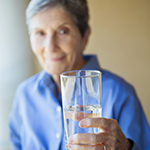Dementia affects millions of people and their families every year, bringing challenges that impact memory, communication, daily functioning, and emotional well-being. Having the option to receive dementia care at home can improve the patient’s quality of life. Residential Home Health offers tailored support to help patients with dementia stay safe, engaged, and independent for as long as possible, while also giving caregivers the tools and guidance they need.
What is Dementia?
Dementia is a broad term that describes a decline in cognitive function severe enough to interrupt daily activities. It’s not a specific disease but a group of symptoms that may include memory loss, difficulty with communication, problem-solving challenges, and changes in mood or behavior. The most common form of dementia is Alzheimer’s disease, but there are several other types, including vascular dementia and Lewy body dementia (LBD).
What Home Health Care Looks Like for Dementia Patients
Home health care for dementia patients is designed to bring comfort, safety, and support into a familiar environment. At Residential Home Health, our dementia care team creates a personalized plan that adapts to the patient’s cognitive, physical, and emotional needs as their condition progresses. Skilled nurses, therapists, and aides provide medication management and mobility support to help with daily routines like bathing, dressing, and meals. Just as important, we offer guidance and respite for caregivers, helping them navigate the challenges of dementia with confidence and compassion. Dementia care at home allows patients to stay where they feel most secure while receiving expert care that prioritizes dignity, safety, and quality of life.
Home-Based Activities for Patients with Dementia
Engaging in meaningful activities can help patients with dementia maintain cognitive skills, boost mood, and reduce feelings of frustration or isolation. Activities should be simple, enjoyable, and tailored to the individual’s abilities and interests. Some home-based activities include:
- Music and Singing: Playing familiar songs can spark memories and reduce anxiety.
- Arts and Crafts: Creative activities like painting, coloring, or simple DIY projects can offer a sense of purpose, stimulate the mind, and spark joy.
- Gentle Exercise: Chair yoga, walking, or stretching can improve mobility and circulation.
- Puzzles and Sorting Games: Simple puzzles, matching cards, or sorting objects by color or shape can help maintain focus and coordination.
Tips for Dementia Caregivers
Caring for a loved one with dementia can be deeply meaningful, but it can also come with emotional and physical challenges. Here are several tips that can make a difference for caregivers. . Establishing a consistent routine can bring comfort and reduce stress for both the patient and caregiver. Simple tools like visual cues and gentle reminders can help guide daily tasks and foster a sense of independence. Patience is essential. Take your time, offer reassurance, and try to see the world through your loved one’s eyes. Most importantly, know that you don’t have to do it all alone. Asking for help or taking a break is an important step to continue providing the compassionate care your loved one deserves.
Memory Care at Home
The best way to care for someone with dementia is to stay informed, seek support, and lead with compassion. In-home dementia care allows patients to stay in familiar surroundings, which can help reduce confusion and support cognitive well-being. At the same time, it gives families access to trained professionals who can provide expert care, monitor changes, and offer peace of mind.
If your loved one is showing signs of dementia or you’re struggling to manage care at home, Residential Home Health is here to help. Our compassionate team delivers personalized dementia care at home, supporting both patients and families every step of the way.




 Though hydration is important for healthy living at any age, seniors are at greater risk of dehydration due to physical and physiological changes that occur during the natural aging process. With potentially dangerous symptoms of dehydration like disorientation, constipation, and low blood pressure, it is important to keep your loved one hydrated.
Though hydration is important for healthy living at any age, seniors are at greater risk of dehydration due to physical and physiological changes that occur during the natural aging process. With potentially dangerous symptoms of dehydration like disorientation, constipation, and low blood pressure, it is important to keep your loved one hydrated.